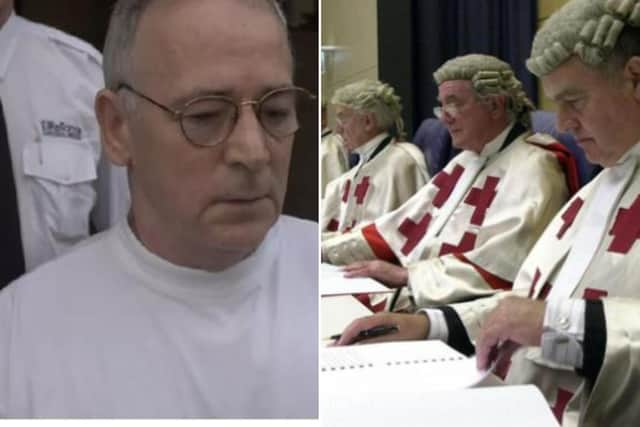Edinburgh crime news: What is double jeopardy? What does serial killer Angus Sinclair have to do with the change in law in Scotland?
and live on Freeview channel 276
What is Double Jeopardy?
Double Jeopardy, in legal terms, is when someone is prevented from being tried twice for the same crime.
It is founded on the principle that if a jury has acquitted a person of a crime, they cannot be accused of that crime again.
This used to be the law in Scotland.
When did it change?
Advertisement
Hide AdAdvertisement
Hide AdThe Scottish Parliament passed the Double Jeopardy (Scotland) Act on April 27 2011, and came into force on November 28 of the same year.
This did confirm that a person cannot be tried twice for the same time, but there are three exceptions written into the law.


These are:
Tainted acquittals – where the acquittal is tainted by offences including bribery, perverting the course of justice and perjury, though perjury alone is not enough for a retrial. When the person acquitted has made an admission of guilt that is considered credible. Where new evidence has been found. This evidence has to have been found with ordinary diligence in the first trial, and should substantially strengthen the case against the accused.
When the bill was passed, the Scottish Government ignored the advice of the Scottish Law Commission, who believed that the new law should only apply to future trials.
Advertisement
Hide AdAdvertisement
Hide AdThe law that was passed also applied to retrospective trials.
Who was Angus Sinclair?
Angus Sinclair was a Scottish serial killer, who died in prison in March 2019.
In 2007 he was tried for the murders of Christine Eadie, 17, and Helen Scott, 17, whose horrific killing was known as the World’s End Murders, due to the girls last being seen alive leaving the World’s End pub in Edinburgh.
He was already serving a life sentence for the murder of 17-year-old Mary Gallacher on a footpath in Glasgow, and had previously been found guilty of the culpable homicide of his eight-year-old neighbour Catherine Reehill, also in Glasgow.
What did he have to do with the Double Jeopardy (Scotland) Act?
Advertisement
Hide AdAdvertisement
Hide AdSinclair appeared in court in 2007 for the World’s End Murders trial.
He claimed that sex with the women was consensual, and that the murderer must have been his late brother in law Gordon Hamilton.
The Crowns case appeared to be circumstantial and the case was eventually scrapped before it was put to the jury, with Sinclair acquitted.
The media outrage that a man, found guilty several times for rape, murder and culpable homicide, had ‘no case to answer’ in court was wide spread.
Advertisement
Hide AdAdvertisement
Hide AdA legal debate raged after the Lord Advocate, Elish Angiolini, addressed the Scottish Parliament saying she was ‘disappointed’ in the decision, and believed the jury should have been able to decide the verdict.
Later in 2007, spearheaded by then Justice Secretary Kenny MacAskill, the case of Sinclair was passed over to the Scottish Law Commission to investigate.
The Scottish Law Commission published its report a year later, which included the issue of Double Jeopardy, and on the back of this, the Parliament acted to change the law.
After the Double Jeopardy (Scotland) Act came into affect, Lothian and Borders Police reopened the World’s End case.
Advertisement
Hide AdAdvertisement
Hide AdThree separate judges examined their evidence and all agreed that the threshold had been met, and Angus Sinclair was rearrested and charged.
On November 14, 2014, he was found guilty of the murders of Helen Scott and Christine Eadie and sentenced to a minimum term of 37 years in prison, the longest sentence ever given in a Scottish court.
He died in prison in 2019.